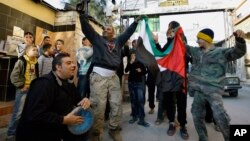CAIRO —
The death of former Israeli prime minister Ariel Sharon Saturday is drawing mostly sober reaction across the Middle East.
In Egypt, state TV showed old footage of Sharon with his troops, fighting in the Sinai during Israel's capture of the region in the 1967 Arab-Israeli War. Many Egyptians accuse Sharon of ordering the execution of Egyptian Army prisoners who had surrendered.
Some Palestinians in Lebanon and the West Bank rejoiced, while many appear to be ignoring it. Palestinians blame Sharon for the 1982 massacres at two refugee camps in Beirut during Israel's invasion of Lebanon.
Witnesses say some Palestinians in the Ain el-Helwa refugee camp in the Lebanese port city of Sidon fired automatic rifles into the air to celebrate the death of Sharon.
Lebanon's pro-Iranian Hezbollah group showed footage of then-Israeli general Sharon with a stunned look on his face after local guerillas blew up an Israeli intelligence headquarters in the port city of Tyre. Scores of Israelis were killed in the blast, which leveled the building.
Souheil Natour, who represents the pro-Syrian Democratic Front for the Liberation of Palestine in Lebanon, told Iran's Press TV that Sharon was the “symbol of Israeli extremism against the Palestinian people,” who “spent his whole life killing people.”
Many in Lebanon mostly ignored the news.
A veteran analyst and commentator in Lebanon said Sharon, who had been in a coma since 2006, “has been dead for 8 years already. What has changed?”
Sharon is remembered in the Arab world for having blood on his hands, says Middle East scholar Nadim Shehadi of Chatham House in London. Shehadi points to Sharon's legacy of hawkishness and says his name will always be associated with the massacre of Palestinians in the Sabra and Shatila refugee camps.
However, towards the end of his life, Sharon had become less of a hardliner.
"In the end he was not such a hawk when he formed [the] Kadima [Party]," said Shehadi. "The rationale behind the formation of Kadima was that Israel is no longer threatened by conventional warfare. The main threat was demographic and Kadima was for separation."
In Gaza, a Hamas spokesman said Sharon's death an “historic moment.” Sami Abu Zuhri said Sharon was “a tyrant, with lots of Palestinian blood on his hands.”
In Egypt, state TV showed old footage of Sharon with his troops, fighting in the Sinai during Israel's capture of the region in the 1967 Arab-Israeli War. Many Egyptians accuse Sharon of ordering the execution of Egyptian Army prisoners who had surrendered.
Some Palestinians in Lebanon and the West Bank rejoiced, while many appear to be ignoring it. Palestinians blame Sharon for the 1982 massacres at two refugee camps in Beirut during Israel's invasion of Lebanon.
Witnesses say some Palestinians in the Ain el-Helwa refugee camp in the Lebanese port city of Sidon fired automatic rifles into the air to celebrate the death of Sharon.
Lebanon's pro-Iranian Hezbollah group showed footage of then-Israeli general Sharon with a stunned look on his face after local guerillas blew up an Israeli intelligence headquarters in the port city of Tyre. Scores of Israelis were killed in the blast, which leveled the building.
Souheil Natour, who represents the pro-Syrian Democratic Front for the Liberation of Palestine in Lebanon, told Iran's Press TV that Sharon was the “symbol of Israeli extremism against the Palestinian people,” who “spent his whole life killing people.”
Many in Lebanon mostly ignored the news.
A veteran analyst and commentator in Lebanon said Sharon, who had been in a coma since 2006, “has been dead for 8 years already. What has changed?”
Sharon is remembered in the Arab world for having blood on his hands, says Middle East scholar Nadim Shehadi of Chatham House in London. Shehadi points to Sharon's legacy of hawkishness and says his name will always be associated with the massacre of Palestinians in the Sabra and Shatila refugee camps.
However, towards the end of his life, Sharon had become less of a hardliner.
"In the end he was not such a hawk when he formed [the] Kadima [Party]," said Shehadi. "The rationale behind the formation of Kadima was that Israel is no longer threatened by conventional warfare. The main threat was demographic and Kadima was for separation."
In Gaza, a Hamas spokesman said Sharon's death an “historic moment.” Sami Abu Zuhri said Sharon was “a tyrant, with lots of Palestinian blood on his hands.”




